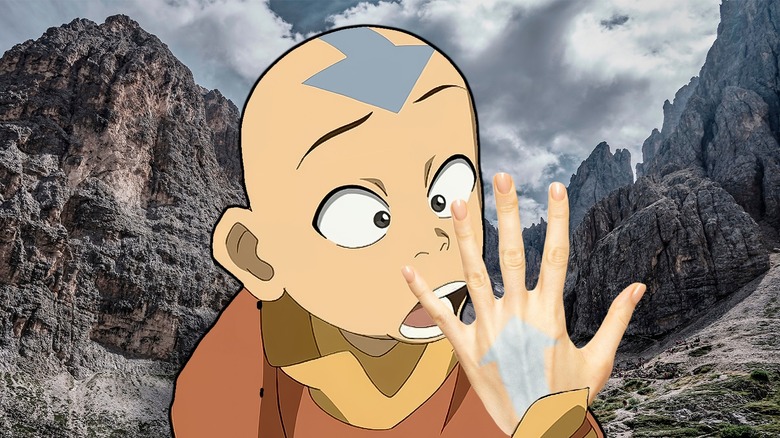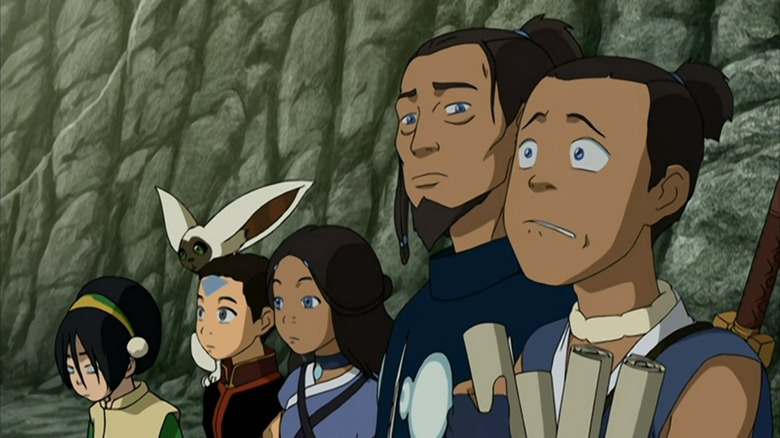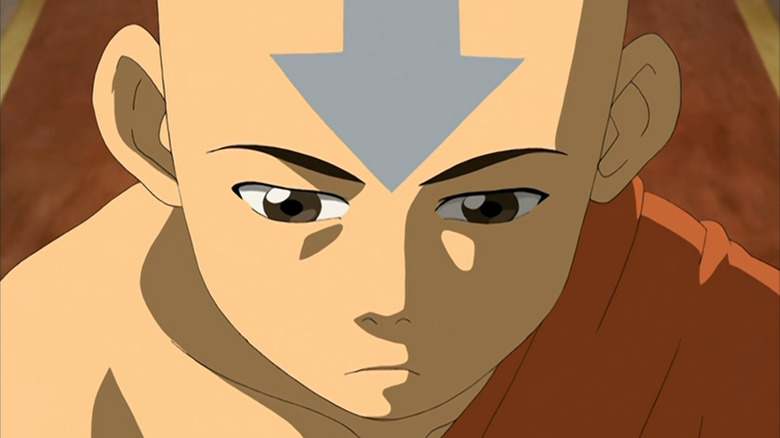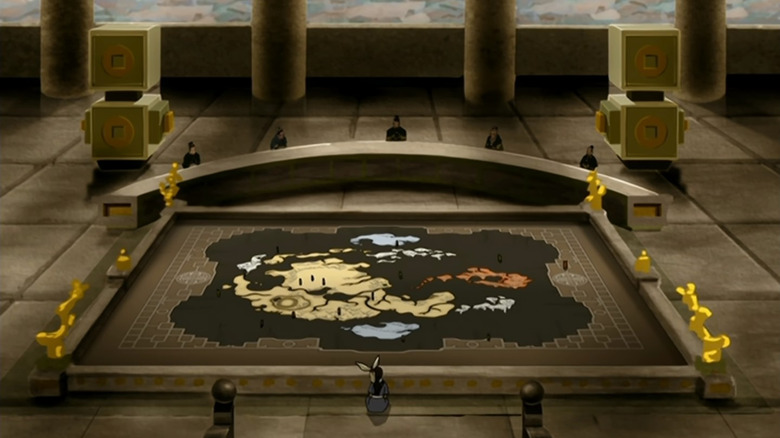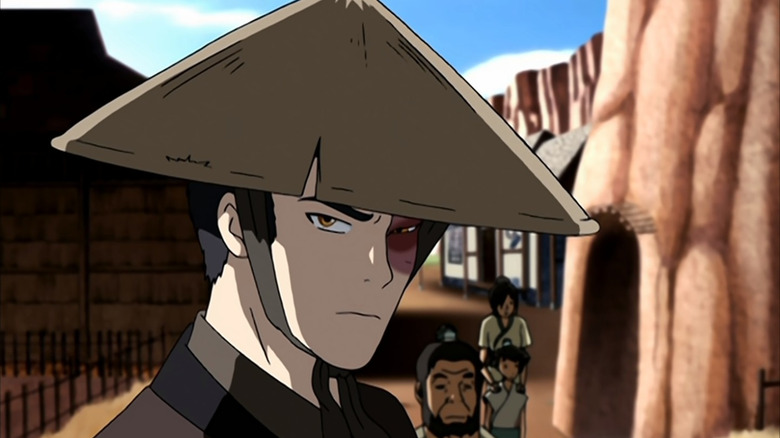Netflix's Avatar: The Last Airbender Remake Is Dead On Arrival, Even If It's Great
Long ago, the four nations lived together in harmony. Then, everything changed when Netflix announced a live-action remake of "Avatar: The Last Airbender" led by the original creators, who then left, citing creative differences, and joined Paramount to helm a new animation studio dedicated to the franchise.
If you're an "Avatar" fan, the last couple years have been both exciting and tumultuous. The original show rose to new heights of popularity after going up on Netflix early in the Covid-19 pandemic, becoming the streamer's most-watched animated kids' show 12 years after it went off the air. Unsurprisingly, Netflix tried to capitalize. They brought in Bryan Konietzko and Michael DiMartino — the duo responsible for both "Airbender" and "The Legend of Korra" — to remake the original show with some modern prestige TV stylings. But after the relationship soured, Konietzko and DiMartino returned to Nickelodeon to head up Avatar Studios. Netflix's adaptation continued under new leadership.
Since the creation of Avatar Studios, the franchise and its fans have been in a bit of a no-man's land. New animated series and films are on the horizon at Paramount, which will continue to expand the official canon. At the same time, the Netflix series is still set for a release in 2023, preceding any of Nickelodeon's upcoming "Avatar" projects. Unfortunately for Netflix, the remake is already doomed to fail — and not just because of the shadow cast over it by the show's last live-action adaptation.
What Avatar rights does Netflix actually have?
Media rights can be a tricky thing. In the modern streaming landscape, that's truer than ever. While Netflix's exact deal with Paramount Global (then Viacom CBS) for the "Avatar" rights has never been made public, there's a lot we can assume from what we do know. And it doesn't look good for Netflix.
After Konietzko and DiMartino left the Netflix adaptation in 2020, Observer chatted with entertainment law expert Matthew V. Wilson about what the future of the franchise might look like. Based on the digital availability of both "Airbender" and "Korra" at the time, Wilson theorized that Netflix had acquired no adaptation rights for the sequel series, and that the streamer only possessed "the exclusive right to create the adaptation coupled with a long-term right to monetize it." Functionally, that would mean that Netflix is only able to adapt the source material of the original show.
This is backed up by Paramount's own actions since. When the rights were first acquired by Netflix, there was no Avatar Studios, or even a Paramount+. It's likely that the company failed to realize the value of the franchise when it licensed it out to Netflix, but now Nickelodeon has tons of new "Avatar" projects in the works. Netflix likely lacks the rights to adapt "Korra" and clearly can't craft new stories. That only leaves the three original seasons of "Airbender" for an unknown (but certainly finite) amount of time.
Netflix's Avatar remake already has a lot of problems.
Even if it's great, Netflix's "Avatar: The Last Airbender" remake has a very small window for success. With only the three seasons of the original series to work with, there's hardly any room for expansion. There will likely be no spin-offs, as the streamer has attempted with franchises like "The Witcher," and certainly no sequels. Of course, given Netflix's reputation for early cancellations, the remake may not even make it to Season 3.
Plenty of talented people are working on the Netflix series, so it could be great in its own right. But that's far from a guarantee. Huge doubts were cast on the adaptation when DiMartino and Konietzko left, with the latter citing "a negative and unsupportive environment." And after the recent failures of similar projects like Netflix's critically-panned live-action "Cowboy Bebop" remake — which was cancelled after one season — it makes sense to be cautious.
Before it's even premiered, the live-action series has become an albatross around the streamer's neck. At best, it will be a good adaptation that tides fans over until Avatar Studios starts releasing new material. But since Paramount likely won't grant any more rights, it'll basically be an extended commercial for the upcoming animated films and shows. At worst, it'll be a repeat of M. Night Shyamalan's 2010 disaster — another laughing stock for fans to mock and ignore in equal measure.
The Netflix show will quickly be forgotten when new animated stories are released
Imagine you're a Netflix executive in the summer of 2020. You've acquired the rights to one of the most popular TV shows of the 21st century — one that's full of rich world-building and ripe for development. The franchise's parent company is doing nothing with it, and if your live-action adaptation goes well, Netflix could become the new home of "Avatar" for the foreseeable future.
But then the showrunners leave, taking a lot of your credibility with them, and Nickelodeon announces extensive plans to expand the series under their watchful eyes. Your hopes for the future are dashed, but you've still spent a lot of money trying to get this adaptation off the ground. It wouldn't have made business sense for Netflix to abandon the project entirely. But at the same time, it's hard to imagine it having much staying power.
To be clear, there are lots of promising things about the remake. The focus on racial equity and cultural authenticity both in front of and behind the camera is a great start, especially since the original series featured a predominantly white voice cast. And the upcoming season will likely get a lot of views simply based on name recognition. But then what? Even if it's great and leaves viewers wanting more, Netflix can't provide it. By the time a Season 2 could come out, Avatar Studios' first film will likely have already hit theaters. That movie is set to follow the original series' characters as adults, and it's only the beginning of what the studio has planned.
The original Avatar is just too beloved to ever be usurped
If the folks at Netflix can't tell new "Avatar" stories, and their projects aren't recognized as canon, and they can't adapt "The Legend of Korra," then what's the optimal scenario for their remake? The only real way for it to be a lasting win would be by usurping the original. And that's just not happening.
"Avatar: The Last Airbender" is one of the most beloved shows of the past 20 years. It's a series that many consider to be nearly perfect, and which, thanks to its gorgeous animation, is basically timeless. Remaking it isn't like remaking "Battlestar Galactica" or "Hawaii Five-0." It's not some old show from a bygone era, or a cult classic with its share of problems. The Netflix adaptation is more comparable to the latter-day Disney live-action remakes. Sure, Emma Watson's "Beauty and the Beast" made money, but nobody's watching it at home for fun instead of the original. Now imagine that Warner Bros. owns the original movie instead of Disney, and that they're making a big-budget "Beauty and the Beast" animated series. That's the situation Netflix is currently in.
Here's the best-case scenario: An ardent Netflix subscriber with no knowledge of "Avatar" watches the remake. It's fantastic, and they love it. They love it so much that they can't wait for Season 2, so they watch the original series instead. Now they're enraptured. They watch "The Legend of Korra." Maybe they even read the Avatar Kyoshi novels. And by the time Season 2 comes out (if it even does), Avatar Studios has released its first feature film.
Netflix can create the greatest "Avatar" adaptation ever, but all they'll be making in the long term is more Paramount+ subscribers.
